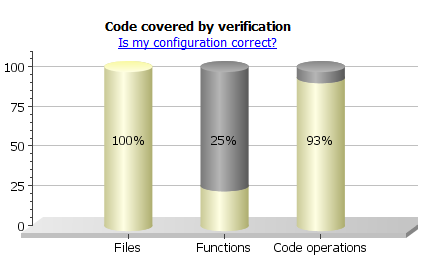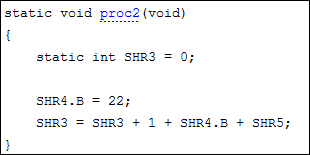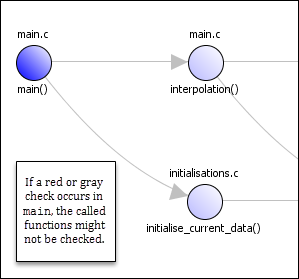Reasons for Unchecked Code
Issue
After verification, you see in the Code covered by verification graphs that a significant portion of your code has not been checked for run-time errors.
For instance, in the following graph, the Dashboard pane shows that as much as 75% of your functions have not been checked for run-time errors. (In the functions that were checked, only 7% of operations have not been checked.)

The unchecked code percentage in the Code covered by verification graph covers:
Functions and operations that are not checked because they are proven to be unreachable.
They appear gray on the Source pane.

Functions and operations that are not proven unreachable but not checked for some other reason.
They appear black on the Source pane.

Click the Code covered by verification graph to see a list of unchecked functions.
Possible Cause: Compilation Errors
Only files without compilation errors are fully analyzed. In files containing compilation errors, depending on the nature of the compilation error, some of the functions might not be analyzed:
If the compilation error occurs inside a function body, only the remaining functions in the file that do not have compilation errors get analyzed.
If the compilation error occurs in the function signature or outside a function body, depending on the nature of the compilation error, the remaining functions in the file might or might not be analyzed.
To see if some files did not compile, check the Output
Summary or Dashboard pane. To make sure that
all files compile before analysis, use the option
Stop analysis if a file does not compile (-stop-if-compile-error).
Solution
Fix the compilation errors and rerun the analysis.
For more information on:
How the Polyspace® compilation works, see Troubleshoot Compilation and Linking Errors.
Specific compilation errors, see Troubleshoot Compilation Errors.
Possible Cause: Early Red or Gray Check
You have a red or gray check towards the beginning of the function call hierarchy. Red or gray checks can lead to subsequent unchecked code.
Red check: The verification does not check subsequent operations in the block of code containing the red check.
Gray check: Gray checks indicate unreachable code. The verification does not check operations in unreachable code for run-time errors.
If you call functions from the unchecked block of code, the verification does not check those functions either. If you have a red or gray check towards the beginning of the call hierarchy, functions further on in the hierarchy might not be checked. You end up with a significant amount of unchecked code.

For instance, in the following code, only 1 out of 4 functions are checked and the
Procedure graph shows 25%. The functions
func_called_from_unreachable_1,
func_called_from_unreachable_2 and
func_called_after_red are not checked. Only
main is
checked.
void func_called_from_unreachable_1(void) {
}
void func_called_from_unreachable_2(void) {
}
void func_called_after_red(void) {
}
int glob_var;
void main(void) {
int loc_var;
double res;
glob_var=0;
glob_var++;
if (glob_var!=1) {
func_called_from_unreachable_1();
func_called_from_unreachable_2();
}
res=0;
/* Division by zero occurs in for loop */
for(loc_var=-10;loc_var<10;loc_var++) {
res += 1/loc_var;
}
func_called_after_red();
}
Solution
See if the main function or another Tasks
function has red or gray checks. See if you call most of your
functions from the subsequent unchecked code.
To navigate from the main down the function call hierarchy
and identify where the unchecked code begins, use the navigation features on the
Call Hierarchy pane. If you do not see the pane by
default, select Window > Show/Hide View > Call Hierarchy. For more information, see Call Hierarchy in Polyspace Desktop User Interface.
Alternatively, you can consider an arbitrary unchecked function and
investigate why it is not checked. See if the same reasoning applies for many
functions. To detect if a function is not called at
all from an entry point or called from
unreachable code, use the option Detect uncalled functions (-uncalled-function-checks).
Review the red or gray checks and fix them.
Possible Cause: Incorrect Options
You did not specify the necessary analysis options. When incorrectly specified, the following options can cause unchecked code:
Multitasking options: If you are verifying multitasking code, through these options, you specify your entry point functions.
Possible errors in specification include:
You expected automatic concurrency detection to detect your thread creation, but you use thread creation primitives that are not yet supported for automatic detection.
With manual multitasking setup, you did not specify all your entry points.
Main generation options: Through these options, you generate a
mainfunction if it does not exist in your code. When verifying modules or libraries, you use these options.You did not specify all the functions that the generated
mainmust call.Inputs and stubbing options: Through these options, you constrain variable ranges from outside your code or force stubbing of functions.
Possible errors in specification include:
You specified variable ranges that are too narrow causing otherwise reachable code to become unreachable.
You stubbed some functions unintentionally.
Macros: Through these options, you define or undefine preprocessor macros.
You might have to explicitly define a macro that your compiler considers implicitly as defined.
Solution
Check your options in the preceding order. If your specifications are incorrect, fix them.
Possible Cause: main Function Does Not Terminate
This cause applies only for multitasking code when entire entry-point functions are not checked.
If you configure multitasking options manually, you must follow the restrictions
on the Polyspace multitasking model. In particular, the main
function must not contain an infinite loop or a run-time error. Otherwise,
entry-point functions are not checked.
For instance, in this example, task2 is not checked even if you
specify it as an entry point. The reason is the infinite loop in the
main
function.
void performTask1Cycle(void);
void performTask2Cycle(void);
void main() {
while(1) {
performTask1Cycle();
}
}
void task2() {
while(1) {
performTask2Cycle();
}
}You see the while keyword in the main
function underlined in dashed red. A tooltip indicates that the loop might not
terminate.
![]()

![]()
Likewise, if a run-time error occurs, the function call leading to the run-time error is underlined in dashed red with an accompanying tooltip.
Solution: Terminate main Function
Fix the reason why the main function does not terminate.
If the reason is a definite run-time error (red check), fix the error.
If the reason is an infinite loop, see why the loop must be infinite.
If the infinite loop in the
mainfunction represents a cyclic task, terminate themainfunction and move the infinite loop to another entry-point function. You can make this change only for the purposes of Polyspace analysis without actually modifying yourmainfunction. See Configuring Polyspace Multitasking Analysis Manually.